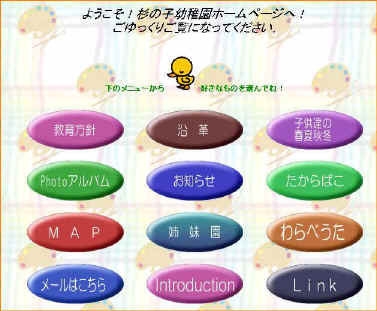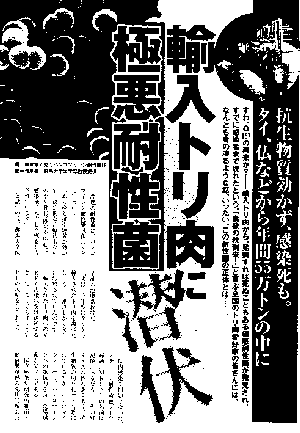FDA to Ban 2 Poultry Antibiotics
By Marc Kaufman
Washington Post Staff Writer
Friday, October 27, 2000;
The Food and Drug Administration
announced plans yesterday to ban the use of two antibiotics used by
poultry farmers to keep chickens and turkeys healthy, saying the
practice increases the danger that humans will become infected with
germs that resist treatment.
The removal would mark the first time the
government has pulled any drug to combat infections that have grown
resistant to antibiotics, a rising problem that public health
officials have been warning for years could return the world to the
days before penicillin and other infection-killers.
The action would also be the first
specifically aimed at reducing the use of any specific antibiotics by
livestock farmers, a practice that has increasingly raised alarms that
it may boost the transmission of resistant microbes from animals to
people.
Public health organizations, including the
federal Centers for Disease Control and Prevention and the World
Health Organization, have strongly advocated such a ban for years. But
agriculture and pharmaceutical interests have successfully held them
off until now.
Abbott Laboratories of North Chicago, Ill.,
maker of one of the drugs, will withdraw its antibiotic immediately,
according to the FDA. But Bayer Corp. Animal Division, of Shawnee
Mission, Kan., which dominates the market, said it will consider
whether to request a hearing to contest the proposed ban.
"We want to take a look at the basis of
the [FDA's] decision," said Senior Vice President John Payne.
"We have always said if we thought our product is causing harm,
we would do the right thing."
The antibiotics in question are in the class
known as fluoroquinolones, which have been available for human use
since 1986 and are commonly prescribed to treat serious
gastrointestinal illness, including from the common campylobacter
bacteria. The FDA action would not affect the availability of the
drugs for humans.
The drugs were approved for chickens, turkeys
and cattle in the mid-1990s, and since then the incidence of
resistance to fluoroquinolones in people has increased dramatically.
After years of testing and construction of an elaborate risk
assessment, the FDA concluded earlier this year that the health of at
least 5,000 Americans is affected each year by the use of these drugs
in chickens.
These people eat animals that are carrying
resistant campylobacter bacteria because the animals were treated with
fluoroquinolones. If the bacteria make people sick and they seek
treatment, fluoroquinolones will be far less effective than normal.
This could be life-threatening to the elderly, to children and to
people with depressed immune systems.
While the consequences of fluoroquinolone
resistance may not be grave to most people, public health officials
call it the tip of an iceberg of rising resistance to dozens of other
life-saving antibiotics. Resistance develops when antibiotics are
overused, both by doctors treating people and by farmers treating
animals. An estimated 40 percent of the nation's antibiotic use is in
livestock.
The FDA selected fluoroquinolones to study
because they are so commonly used and because the agency was able to
collect the necessary data to directly link the drugs' use in chickens
with a specific problem in people.
The drugs, Baytril from Bayer and SaraFlox
from Abbott, are used to treat respiratory problems in chickens and
turkeys. Because the birds are raised in large flocks, it is
impossible to treat the birds individually, and so the drugs are used
in the flocks' drinking water. About 1.5 percent of chickens are
treated with the antibiotics, according to industry sources. Without
the drugs, farmers would be forced to find other ways to protect their
flocks from illness.
The FDA is reviewing the use of
fluoroquinolones in cattle as part of a comprehensive examination of
all agricultural antibiotic use.
If Bayer challenges the ban for poultry,
either in court or through an administrative appeal, it could take
months for the issue to be resolved.
Reflecting the worries of Bayer and the
animal pharmaceutical industry, several members of Congress wrote to
Health and Human Services Secretary Donna E. Shalala on Wednesday,
voicing concern about the FDA's impending action.
"The FDA's decision regarding
fluoroquinolone use will set a precedent for all future activity
regarding antibiotic resistance and will have a significant impact on
the livelihood of hard-working poultry growers and on food
safety," wrote Rep. Calvin M. Dooley (D-Calif.). "Given
these implications, FDA must make the process more transparent and
must render a decision based on fact rather than fear."But
advocates of a more restrained use of antibiotics hailed yesterday's
action.
Rep. Sherrod Brown (D-Ohio) said that the
issue of antibiotic resistance has become increasingly important to
scientists, regulators and the public. He said the Center for
Veterinary Medicine, an arm of the FDA, has just been allocated $3
million to study the problem, the first appropriation of its kind.
"This has never happened before, and
it's quite exciting," said Fred Angulo, who follows antibiotic
resistance for the CDC. "The agency recognizes there is a problem
that has to be corrected, and consumers will be the
beneficiaries."
"There was tremendous opposition to the
use of fluoroquinolones when FDA first approved them for treating
flocks of poultry, and I suppose you can say the chickens have now
come home to roost," said Michael Jacobson, director of the
Center for Science in the Public Interest, a consumer group.
"This action will reduce the spread of bacteria that are not
sensitive to a very powerful antibiotic, and that is good for public
health."
© 2000 The Washington Post
Company




